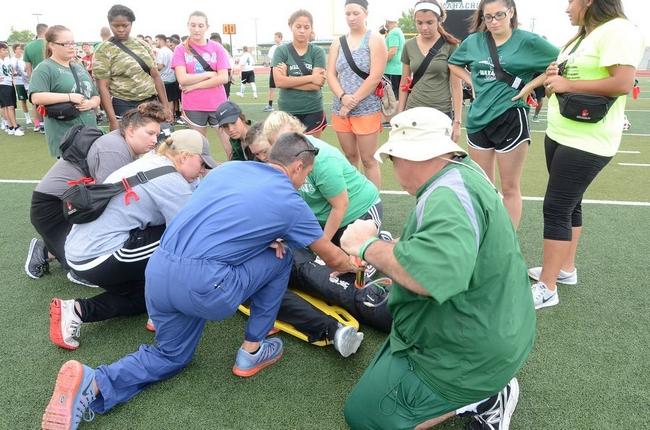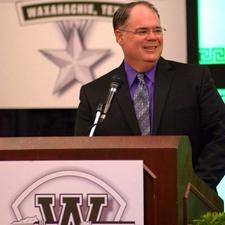
Article reposted from DayLight
Author: Scott Dorsett
While much has changed in both rules and equipment over the past two decades to ensure player safety, there will always be injuries in high school athletics. From non-contact sports like tennis and volleyball to hard-hitting football games, the slightest slip, sudden twist or violent collision can sometimes result in serious injury.
So it was no surprise during Thursday afternoon’s football practice at Lumpkins Stadium when a Waxahachie High School football coach crumpled to the turf after colliding with a player. It was also no surprise that Waxahachie’s trainers were on the field within a matter of seconds.
While Thursday’s collision and injuries were only part of a drill, it served as a real-world training scenario that WISD head athletic trainer David ‘Doc’ Bowdoin said will make the training staff better in real-world situations where every minute counts.
WISD’s team physician, Dr. Marc Roux has been an orthopedic surgeon since 2005, echoed Doc’s sentiments and can be found on the sidelines of every WHS varsity football game.
“Probably one of the most important things we as first responders can ever respond to is a head or neck injury,” Roux said. “These are injuries you can’t revisit enough. whether you’re a young trainer or experienced trainer, drills like this help build communication skills and teamwork.”
Roux credited the leadership of veteran WISD Head Athletic Trainer Bowdoin and assistant athletic trainer Nikki Robinson in their efforts to prepare student trainers to deal with a broad range of injuries.
“Honestly, you could be a layperson, and with this type of leadership and experience, they could walk you through immobilizing someone in situations like the one here tonight,” Roux said.
Bowdoin, who is well into his second decade as head athletic trainer for WISD said experience helps his student trainers more than anything.
“I think everyone did well tonight,” Bowdoin said. “This is our second year to do this outdoors, and some of our student trainers were part of those drills last year, and you could really see that experience come out.”
Assistant trainer Nikki Robinson credited on ongoing dialog with Roux, Bowdoin, and new assistant athletic trainer Alex Vega as a key to having the proper equipment and techniques in place to make sure student athletes have the best care possible.
“We’re constantly reviewing what we want to accomplish in situations like this,” Robinson said. “We talk about having the right tools in place, make sure the coaches understand the injury and provide the necessary care that student-athlete needs until EMS arrives.”
Roux noted that these drills are certainly important, but one of the things that make this such a great team is the ongoing care and treatment the student-athlete receives after an injury.
“Day in and day out, everybody’s on board, every injury is taken seriously, and they evaluate everything thoroughly,” Roux explained. “If more advanced care or treatment is needed, we have an open line of communication, and I think that’s what makes this one of the best athletic training teams in Texas.”
Bowdoin said the level of care after an injury is critical to healing a student-athlete.
“Dr. Roux and I may talk on the phone every day,” he noted. “Marc sees every treatment that we do and knows about every injury that we post. So if a kid is hurt in practice or a game, he’ll already have that athlete’s history of injury or treatment.”
Bowdoin credited the capabilities of today’s athletic training team to longtime team physician, Dr. Dave Williams. Williams, who spent more than 30 years as team physician to WISD student athletes passed away in 2012 but left a legacy of professionalism and personal care that remains as the cornerstone for today’s trainers.
“Dr. Williams was so far ahead of his time in treating the whole person,” Bowdoin said. “His expertise was treating mind, body, and spirit, and if he were here today, I’m sure he would have a big smile on his face. We certainly didn’t have the technology back then that we have today, but his foresight and understanding outpaced anything that was available 30 years ago.”
WISD hired a third athletic trainer in newcomer Alex Vega this year. Vega specializes in corrective exercise, which leans more towards preventative techniques that help to minimize injury or recovery time.
“We look at form and how a student-athlete moves,” Vega explained. “If a student-athlete has trouble squatting, bending, stretching or running, we’ll analyze those movements and put them in the weight room to develop certain muscles or have them warm up a little longer. We see a lot of groin injuries and hip injuries. These are typically associated with an athlete not having enough flexibility.”
Vega said the culture of care student-athletes receive is like nothing she’s seen before coming to Waxahachie.
“It really is different,” Vega said. “The coaches, trainers, and doctors are all on the same page. If we don’t think an athlete is ready to return to play or if he or she needs more treatment or therapy, there are no questions asked.”
WHS head coach Jon Kitna said he wanted Thursday’s drill to be as realistic as possible.
“Coach Kitna filmed the drill, just like he does at practice or in live games,” according to Bowdoin. “We’ll take that video, review it and make any changes necessary to improve. To have a coaching staff that committed to what we do is incredible.”
Bowdoin said that ultimately, his goal is to provide the best care possible to WISD athletes. With more than 50 years of professional medical and athletic training history behind them. It’s probably a safe bet that WISD athletes are in good hands.

